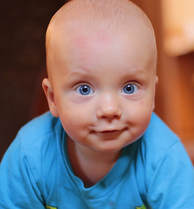
What is Orofacial Myology?
Orofacial Myology (also known as Myofunctional Therapy) is the neuromuscular re-education or re-patterning of the oral and facial muscles.
Normal muscle function and resting postures are essential for proper physical health, growth, breathing, facial and dental development, as well as speech and language development.
Whilst Orofacial Myology has been known and discussed in the research since the 1900s, it is emerging as a critical therapy in its own right, with a training and certification process available for dentists, dental therapists and Speech & Language Pathologists.
Who does Orofacial Myology benefit?
Orofacial Myology works on people of all ages - babies, kids and adults - who experience problems due to orofacial dysfunction. Signs and symptoms of orofacial dysfunction include:
What are the advantages of Orofacial Myology Therapy with a Speech Pathologist?
Some symptoms of orofacial dysfunction are already partially addressed by traditional Speech Pathology practices. Adding specialised Orofacial Myology Therapy (OMT) to Speech Pathology treatment where relevant, can significantly enhance Speech Pathology results, meaning better progress and outcomes for our patients.
As an example, a Speech Pathologist will not generally treat a client presenting with a lisp without looking at other tongue habits (an orofacial aspect of speech) that may be interfering with correct sound production.
With Orofacial Myology Therapy, the entire orofacial function can be more effectively assessed and treated, enabling identification and resolution of a diversity of orofacial issues that can impede the progress of standard Speech Pathology treatment.
This is one of the main reasons why Andrea Holland Speech Pathology now includes Orofacial Myology in the available services.
Further information
For more information on Orofacial Myology, please visit the websites of two of the pioneers of this therapy in the USA, Sandra Coulson and Joy Moeller.
If you have any questions, please don't hesitate to contact Andrea Holland directly for a free telephone consultation on 07 3206 3833.
Orofacial Myology (also known as Myofunctional Therapy) is the neuromuscular re-education or re-patterning of the oral and facial muscles.
Normal muscle function and resting postures are essential for proper physical health, growth, breathing, facial and dental development, as well as speech and language development.
Whilst Orofacial Myology has been known and discussed in the research since the 1900s, it is emerging as a critical therapy in its own right, with a training and certification process available for dentists, dental therapists and Speech & Language Pathologists.
Who does Orofacial Myology benefit?
Orofacial Myology works on people of all ages - babies, kids and adults - who experience problems due to orofacial dysfunction. Signs and symptoms of orofacial dysfunction include:
- habits such as thumb, finger or pacifier sucking
- habitual mouth breathing
- chronic snoring
- tongue and / or lip ties, affecting normal mobility of the tongue and mouth
- tongue-thrust (where the tongue rests on the bottom of the mouth and comes forward when drinking or eating in an almost sucking pattern)
- nail-biting
- clothes-chewing
- hyper-sensitivity of the mouth (often presenting in aversion to tooth-brushing, sensitive gag reflex, difficulty with and dislike of different food textures and temperatures)
- reduced awareness and sensitivity of the mouth area (often associated with open mouth, tongue forward postures, excessive drooling and / or messy eating)
What are the advantages of Orofacial Myology Therapy with a Speech Pathologist?
Some symptoms of orofacial dysfunction are already partially addressed by traditional Speech Pathology practices. Adding specialised Orofacial Myology Therapy (OMT) to Speech Pathology treatment where relevant, can significantly enhance Speech Pathology results, meaning better progress and outcomes for our patients.
As an example, a Speech Pathologist will not generally treat a client presenting with a lisp without looking at other tongue habits (an orofacial aspect of speech) that may be interfering with correct sound production.
With Orofacial Myology Therapy, the entire orofacial function can be more effectively assessed and treated, enabling identification and resolution of a diversity of orofacial issues that can impede the progress of standard Speech Pathology treatment.
This is one of the main reasons why Andrea Holland Speech Pathology now includes Orofacial Myology in the available services.
Further information
For more information on Orofacial Myology, please visit the websites of two of the pioneers of this therapy in the USA, Sandra Coulson and Joy Moeller.
If you have any questions, please don't hesitate to contact Andrea Holland directly for a free telephone consultation on 07 3206 3833.
